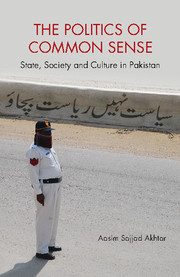Book contents
- Frontmatter
- Dedication
- Contents
- Preface
- Acknowledgments
- 1 Introduction
- 2 The Structure of Power ‘From Above’
- 3 Accumulation in Practice
- 4 The Many Faces of Islam
- 5 The Nation that Never Became
- 6 The Subordinate Classes: Beyond Common Sense?
- 7 Epilogue: What does a Counter-hegemonic Politics Look Like?
- Glossary
- Bibliography
- Index
5 - The Nation that Never Became
Published online by Cambridge University Press: 05 July 2018
- Frontmatter
- Dedication
- Contents
- Preface
- Acknowledgments
- 1 Introduction
- 2 The Structure of Power ‘From Above’
- 3 Accumulation in Practice
- 4 The Many Faces of Islam
- 5 The Nation that Never Became
- 6 The Subordinate Classes: Beyond Common Sense?
- 7 Epilogue: What does a Counter-hegemonic Politics Look Like?
- Glossary
- Bibliography
- Index
Summary
Notwithstanding the growing inf luence of Islam in Pakistan's body-politic, ethnicity rather than religion has been the primary marker of identity in large parts of the country both before and after 1947; outside of the dominant province Punjab, the so-called ‘ideology of Pakistan’ has always been seriously contested. Through the course of this book I have attempted to explain how the politics of common sense came to displace more expansive and transformative political idioms from the Zia period onwards. To truly make this hypothesis a viable one in what is a very ethnically divided country, it is necessary to probe the history of ethnic-nationalism and its relationship with the politics of common sense.
Contrary to official myth, the various ethnic-linguistic communities that came to comprise the new Muslim-majority state were not all f lag bearers of the Pakistan movement. Most famously, Pakhtuns in the Peshawar Valley region largely supported the Congress-allied Khudai Khidmatgars. After the creation of the country, Pakhtun nationalism retained its appeal in the Peshawar Valley and other parts of NWFP, as well as what is today northern Balochistan. Ethnic Sindhis had been protesting political and economic marginalization at the hands of migrants and allottees of state land since well before 1947, notwithstanding the passing of a formal resolution in favour of the Pakistan demand by the Sindh provincial assembly in the lead-up to Partition. Balochistan, which was only formally recognized as a province in 1970, also had what at best could be called an ambivalent relationship to the new state. The Khan of the Kalat state, the large princely territory that comprised most of the Baloch people, repeatedly claimed that he was forced to accede to Pakistan at the barrel of a gun.
In the event, the protestations of various ethnic-linguistic communities in west Pakistan were dramatically overshadowed by the conf lict that erupted immediately after the establishment of the state between the Bengali majority based in east Pakistan and the civil and military bureaucracies dominated by Urdu-speakers and Punjabis respectively. Troubles began as early as 1948 following an infamous speech by Muhammad Ali Jinnah to students in Dhaka in which the country's founder insisted that Urdu would be the official language of the new state, even though Bangla was the native tongue of more than half of Pakistan's population.
- Type
- Chapter
- Information
- The Politics of Common SenseState, Society and Culture in Pakistan, pp. 116 - 131Publisher: Cambridge University PressPrint publication year: 2017



